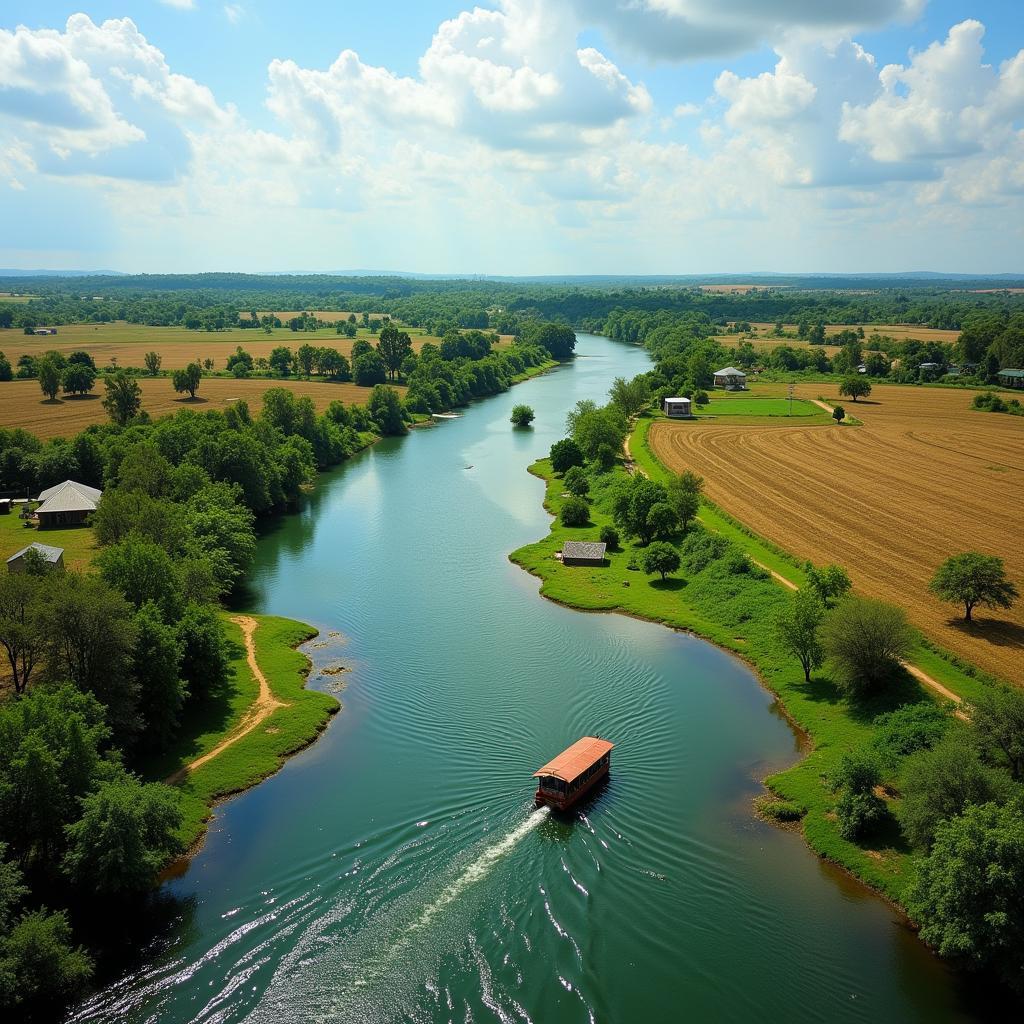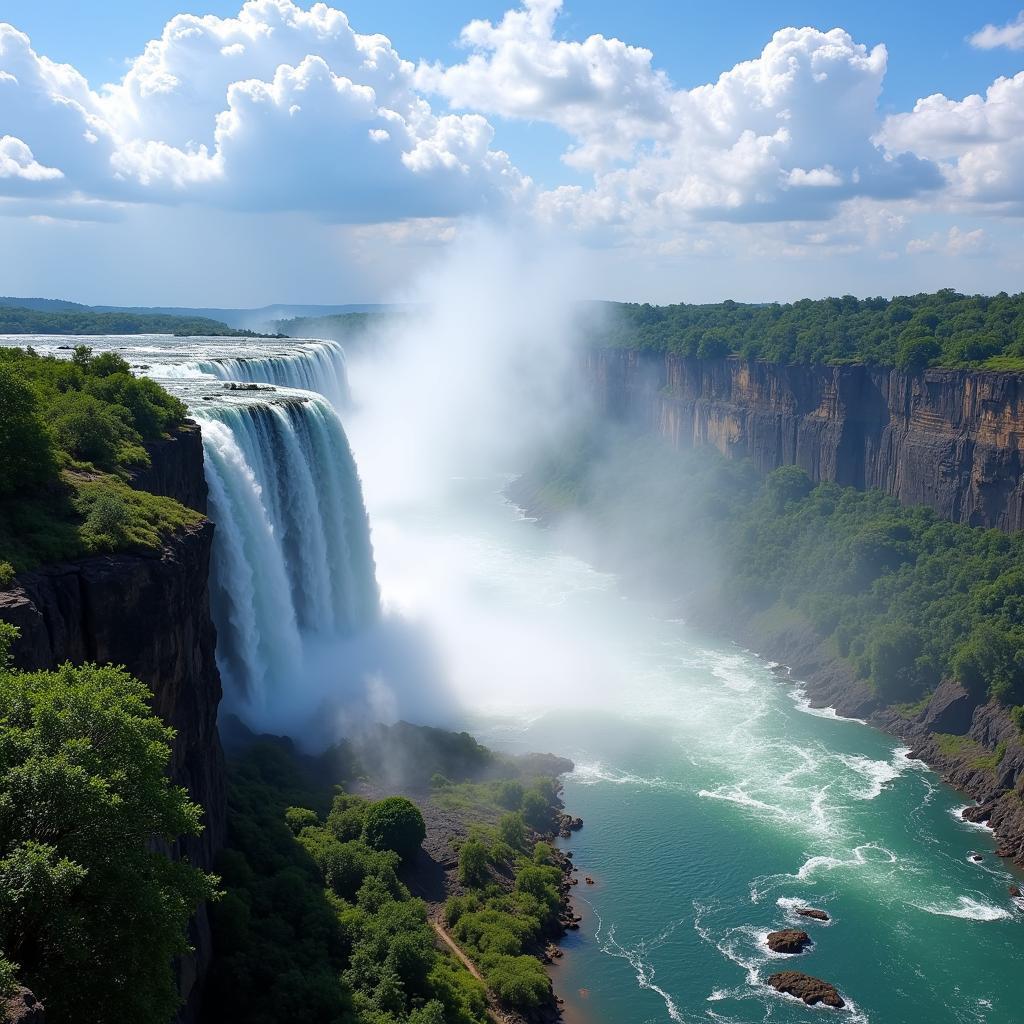Exploring African Countries with Rivers
The Nile: A Lifeline for Northeast Africa
The Nile, the world’s longest river, flows northwards through eleven countries, including Egypt, Sudan, and Ethiopia. It has been the cradle of civilizations for millennia, providing water for agriculture, transportation, and daily life. The annual flooding of the Nile deposited fertile silt, enabling the growth of crops and supporting large populations. Its historical significance and modern-day impact make it a key focus when discussing African countries with rivers.
The Aswan High Dam, built in Egypt, controls the Nile’s flow, preventing floods and generating hydroelectric power. However, its construction also had environmental and social consequences, impacting downstream ecosystems and displacing communities.
The Congo River Basin: A Biodiversity Hotspot
The Congo River, the second longest river in Africa, creates a vast basin that supports one of the world’s most biodiverse ecosystems. This network of tributaries and surrounding rainforests is home to a plethora of plant and animal species, many of which are found nowhere else on Earth. The Congo River, flowing through countries like the Democratic Republic of Congo and the Republic of Congo, serves as a vital transportation route and a source of livelihood for millions.
The river’s resources are also a source of economic activity, including fishing and logging. However, unsustainable practices threaten the delicate balance of this ecosystem, emphasizing the need for careful management and conservation efforts. You can learn more about African countries and capitals and rivers in this helpful resource.
The Zambezi River: Shaping Southern Africa
The Zambezi River, the fourth longest river in Africa, flows through several countries in Southern Africa, including Zambia, Angola, and Mozambique. The iconic Victoria Falls, one of the world’s largest waterfalls, is a testament to the Zambezi’s power and beauty. This river system plays a crucial role in the region, providing water for irrigation, hydropower generation, and supporting diverse ecosystems.
The Kariba Dam, located on the Zambezi River, creates Lake Kariba, one of the world’s largest artificial lakes. The dam provides electricity for Zambia and Zimbabwe, but its construction also displaced thousands of people and altered the natural flow of the river. It’s a clear example of the complex interplay between human development and the environment when discussing African countries with rivers.
The Niger River: West Africa’s Vital Artery
The Niger River, West Africa’s longest river, plays a critical role in the lives of millions. It flows through countries like Nigeria, Mali, and Niger, providing water for agriculture, transportation, and fishing. The Niger River delta is a crucial wetland ecosystem, supporting diverse flora and fauna and providing livelihoods for local communities. The river’s importance is undeniable when exploring African countries with rivers.
 Niger River in West Africa: A Source of Life
Niger River in West Africa: A Source of Life
The increasing demand for water resources due to population growth and climate change poses significant challenges to the sustainable management of the Niger River Basin.
 Zambezi River and Victoria Falls: A Majestic Wonder
Zambezi River and Victoria Falls: A Majestic Wonder
Other Important Rivers and Their Impact
Numerous other rivers, including the Orange River, the Limpopo River, and the Senegal River, also play significant roles in shaping the landscapes and livelihoods of African countries. These rivers provide water resources for various purposes and support unique ecosystems. Their importance, while often overlooked, is vital to understanding the complexities of African geography and the lives of its people. You can find more about this topic on African countries and capitals and rivers. Additionally, if you’re interested in a market analysis pertaining to the African insurance sector, you can find relevant information on African Insurance Market Analysis.
Conclusion
African countries with rivers are intricately linked to the lifeblood of the continent. These waterways shape not only the physical landscape but also the cultural, social, and economic realities of the people who depend on them. Understanding the significance of these rivers is crucial to appreciating the diversity and complexity of Africa. From the Nile to the Niger, these rivers hold stories of ancient civilizations, vibrant ecosystems, and the ongoing challenges of sustainable development.
Expert Insights:
- Dr. Fatima Diallo, Hydrologist: “The rivers of Africa are not just water bodies; they are arteries of life, connecting communities and ecosystems across vast distances.”
- Professor Aboubacar N’Diaye, Environmentalist: “Sustainable management of Africa’s river basins is crucial for ensuring the well-being of present and future generations.”
FAQ
- What is the longest river in Africa? The Nile River is the longest river in Africa and the world.
- Which African river has the largest basin? The Congo River has the largest basin in Africa.
- Why is the Zambezi River important? The Zambezi River provides water resources and hydropower for Southern African countries.
- What are the major threats to African rivers? Pollution, climate change, and unsustainable resource use threaten African rivers.
- How can we protect African rivers? Sustainable water management, conservation efforts, and international cooperation are crucial for protecting African rivers.
Need more support? Contact us 24/7: Phone: +255768904061, Email: kaka.mag@gmail.com, Address: Mbarali DC Mawindi, Kangaga, Tanzania.

